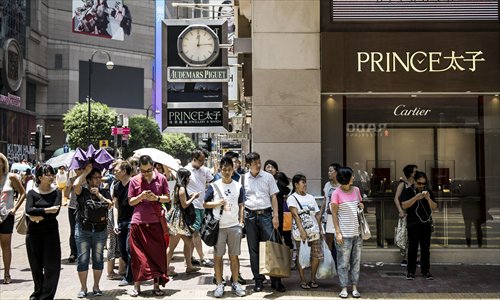HK retains milk powder policy despite sluggish tourism
Govt aims to entice tourists, curb parallel goods trade

Pedestrians wait to cross a road outside a jewelry shop in Hong Kong. Photo: CFP
Maintaining Hong Kong's milk powder quota policy won't affect tourism, analysts said Sunday, even though officials had reportedly suggested that lifting the quota could help to boost retail sales in the region.
Some local lawmakers in Hong Kong recently called for a relaxation of the milk powder quota to boost retail businesses, Beijing-based news portal cnr.cn reported Sunday. However, the Hong Kong Special Administrative Region government issued an announcement over the weekend saying the policy would not be changed.
The Hong Kong government is concerned about the impact on regional tourism and related industries from a recent fall in the number of tourists, which may also lead to economic and employment problems, the announcement said.
But since pregnant women coming to Hong Kong to buy milk powder is not a tourist activity, the government does not intend to change the quota policy for the time being, it also said.
The Hong Kong government placed a sales limit of two cans of milk powder per person in March 2013 to crack down on parallel trading activities by mainland visitors that led to local shortages of milk formula.
Total retail sales in Hong Kong decreased about 2.8 percent in July compared to the same period in 2014, according to data released by the Hong Kong Census and Statistics Department on August 31.
A government spokesman said retail sales growth had been dragged down by a fall in inbound tourism and by the impact of the recent stock market slump on consumer sentiment, according to the department's website.
The government announcement also called on the public to help maintain the image of the region as being a hospitable travel destination.
Tourists from the Chinese mainland have contributed greatly to Hong Kong's retail sales sector in recent years, but the previous bulk purchasing of milk powder has been seen as a trigger of disputes between Hong Kong residents and tourists from the Chinese mainland, Wang Danqing, a partner with Beijing-based ACG Management Consultancy, told the Global Times Sunday.
"The influx of tourists from the Chinese mainland created problems such as a shortage of baby formula and unpleasant tourist behavior," Wang noted.
However, those who smuggled milk powder to the Chinese mainland for resale cannot be considered tourists, Wang Fude, a professor specializing in tourism at Beijing International Studies University (BISU), told the Global Times Sunday.
"They're parallel goods traders, who seriously affect the reputation of the tourists from the mainland," Wang said, noting that their activities have also influenced the daily lives of residents in Hong Kong.
As part of the central government's crackdown on parallel goods traders, visa restrictions were imposed in April to limit Shenzhen residents from travailing to Hong Kong more than once a week, according to media reports in July. After the policy took effect, arrivals from the mainland began to fall.
A Shenzhen resident surnamed Li told the Global Times Sunday that there are fewer tourists from the mainland in Hong Kong's major shopping malls now compared to 2014.
"There is still anti-mainland sentiment, which is driving tourists from the Chinese mainland away," she said.
The number of visitors from the mainland to Hong Kong fell by about 9.8 percent in July, media reports said in August.
It was the fourth straight month of falling tourist numbers.
Following the launch of the milk powder quota in Hong Kong, Li said that she only brings back two cans of milk powder on every trip.
"After the retail business in Hong Kong was affected by the declining numbers of tourists from the Chinese mainland, I've noticed that the attitude of local Hong Kong residents toward visitors from the mainland has started to change," Li noted.
The Hong Kong government wants to welcome tourists from the mainland, said Wang from BISU. "But maintaining the milk powder quota order shows that the authorities won't let parallel goods traders affect Hong Kong's tourism industry," he noted.